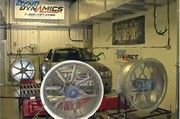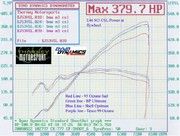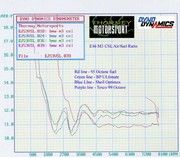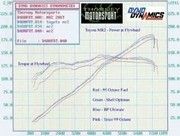Tescos 99 wins fuel shootout
First ever scientific back-to-back power test
Fuel quality affects your car's power -- it's always been a truism but now it's been scientifically proven. And the best stuff you can get in the UK is Tescos 99 Octane.
Thorney Motorsport (TMS) has spent seven months of intensive testing to investigate the effect of fuel quality on an engine's power output. It's scientifically proven what the car tuners already believed: the quality of fuel you use in your car has a direct effect on the level of power your car provides.
TMS boss John Thorne said: "TMS specialises in honest, no bullsh*t tuning of BMW’s and Vauxhalls. Our knowledge, skill and attention to detail have given us a reputation of testing without compromise and product development without compare so when we develop any new product we know it’s the best that can be achieved.
"We spend countless hours seeking new ways to eke out extra power from road and race cars and always knew that the quality of fuel used in the car does make a huge difference in power level and delivery. However, we surprised to find out that no-one had conducted tests on the effects of fuel quality on cars, either tuned or standard.
"Our move to our new £750,000 custom workshop in Milton Keynes, Bucks gave us the opportunity to try the (then) new 99 Octane fuel available from Tesco (there are three local stores, all of which supply the 99 fuel) so we conducted some early testing and were amazed at the results the fuel gave: the cars drove faster, power delivery picked up quicker and they held the power for longer.
"However, anecdotal evidence based on feel is not enough for us to rely on so we set about conducting the most in depth fuel test ever done in the UK."
Thorne documents what happened next.
Equipment
To accurately measure a car’s performance you need an accurate vehicle dynometer. A chassis dynometer (also called a rolling road) is a sophisticated piece of equipment that allows you to drive a car as you would on the open road (the wheels turning on rollers) whilst it is strapped down in a fixed position. The vehicle’s static position allows us to connect up an extensive list of measuring equipment to monitor and measure what the car is doing, including power and torque. Think of it like a patient hooked up to a heart monitor.
Dyno Dynamics is renowned for creating accurate dynos for use by people from car tuners to fuel suppliers. Their accuracy has earned them the nickname the “Ego Buster” for the equipment’s ability to measure data and not manipulate it.
The Dyno Dynamics Low Boy 450 Chassis Dyno has a feature called “Shootout Mode” where the operators ability to manipulate or amend readings is locked down, and all the measuring features are locked off so all the system can do is measure. Such is their faith in the accuracy of their product that all the Dyno Dynamics dynos are linked globally and their measurements monitored to ensure accuracy. Failure to comply with their stringent methods of operation gets you removed from their global list of recognised operators. In short, it’s accurate and has a unique system to ensure that that accuracy is maintained.
To give an accurate reading of what the car is doing on a dyno you need to generate a large airflow to replicate as near as possible the conditions on the open road. To this end, we have installed the highest airflow dyno cell in the UK. Four one metre radial fans generate a combined airflow of over 120,000cfm (cubic feet per minute).
Two fans are situated behind the vehicle to suck out the hot air generated by the vehicle engine and exhaust and two further fans blow air over the vehicle. With all four fans in operation we exchange the entire air contents of the cell every five seconds. Basically, it’s a wind tunnel with a dyno in it.
We mount the dyno on the surface of the floor to allow airflow to run under the vehicle, this allows us to run low race cars but also to allow proper airflow to rear engined cars which need under floor airflow to keep cool. It also allows direct chassis strapping of the vehicle to ensure they are secure and give consistent measurements.
Vehicles
TMS specialises in tuning and enhancing BMWs and Vauxhalls. Our specialist cars are the BMW M3, the Vauxhall VX220 and the Vauxhall VXR range. We are accredited with full Vauxhall Motors warranty approval for servicing and repairs, the only UK tuning firm to have such recognition from any manufacturer.
As a consequence of our area of expertise, it made sense to test cars we knew well so we chose a 2003 BMW E46 M3 CSL, and as a control car a standard Toyota MR2. We are also testing with a 2006 Vauxhall Astra VXR and will release this data when it is finalised.
BMW E46 M3 CSL
The BMW was chosen primarily due to our view that it represents the finest engineered six-cylinder engine ever developed. The S54 engine in CSL form generates 350-360bhp at the flywheel -- an enhancement over the standard M3’s 340bhp. We have modified this further with our ‘Stage 2’ tuning package where we add a Milltek Sport performance exhaust and race catalytic converter and remap the car’s ECU with advanced engine code to give a flywheel power figure of 380bhp.
Toyota MR2
The Toyota was chosen specifically because the car represents an older vehicle but with a recognised advanced design of engine. Run in purely standard form the vehicle should generate 175bhp at the flywheel.
Testing
Thorney Motorsport believes in accurate data collection and vehicle enhancement. Honesty, integrity and transparency are all bywords of our company ethos. We planned the testing (which we imagined could potentially generate politically upsetting results) meticulously so that our data would stand up to scrutiny and expert breakdown.
Each car was initially run for three full fuel tanks on Total 95 Octane fuel, different fuel stations were chosen and the cars filled at different times of the day. After three full tanks were consumed by the vehicle we tested the car on the dyno and recorded the data. Specific data as to weather, barometric reading, humidity, air temperature and engine intake temperature were all recorded.
Next, each car was then run for three full tanks of BP Ultimate 97 Octane fuel and the process repeated. Again all external readings were taken and logged. We then repeated the process again with Shell Optimax and finally Tesco 99 Octane fuel, again we used three full tanks of each fuel between testing and logged all the external and vehicle data on each test.
We repeated this process for about eight months. In total the cars were measured between 18-34 times in temperatures varying from six to 35 degrees ambient. The dyno has an inbuilt compensator to address variations in ambient temperatures but we still ensured that each car was measured in comparable weather conditions -- and that's one of the reasons it took eight months.
Results
The different colour lines represent the different fuels used in the car.
The red line at the bottom shows the car running on 95 octane fuel, the jump in power and torque when changing to either Shell Optimax or BP Ultimate is quite significant. However what we also found was there was another jump when changing to the Tesco 99 Octane fuel (the pink line).
So switching from 95 octane fuel to Tesco 99 Octane gave an extra 8.1bhp (almost five per cent). As well as these peak gains, the charts show a clear improvement throughout the rev range.
For the E46 M3 CSL the difference was even more pronounced. The difference between running 95 Octane fuel and a higher octane fuel from BP or Shell was very noticeable on the open road and the dyno confirmed this, the car did feel sluggish on the lower octane fuel. Interestingly the BP Ultimate and Shell Optimax performed almost identically, a fact quite evident on the chart; the lines are difficult to separate.
But what was clear was the extra gains that Tesco 99 Octane fuel gave over and above the BP and Shell fuels. There was a clear improvement in both torque and power that was both evident on the road and the dyno.
This apparent gain in power is due to the ECU of the car’s ability to advance the ignition timing to take advantage of the extra power the higher octane offers. Looking at the air/fuel ratio on the charts does show that the higher octane fuel allows a more efficient burn creating more power.
The chart shows the car’s ECU when running on 95 Octane fuel enriches the fuel mixture (adds fuel) to compensate for the less efficient burn and to avoid early detonation. This extra fuel robs power as the air/fuel mix is less efficient. By changing this fuel to a higher octane the car is able to advance the ignition (essentially using less fuel at higher rpm’s) to create more power.
Conclusions
Our role is to enhance motor vehicles beyond the process of compromise that manufacturers have to follow. We adapt and extend the operating levels of cars by enhancing their power, handling and braking as customers demand. Any methodology that makes it easier has to be positive.
It is clear that older engines show a clear benefit of running higher octane fuel, but more modern, sophisticated engines have the ability to advance their fuel timing to take full advantage of this enhancement to a far greater degree. For the BMW M3 CSL the difference between running 95 octane fuel and Tesco 99 fuel was over 40bhp; that’s over 10 per cent.
So our clear recommendation to those wanting to maximise a car's power is, before even considering a tuning service, is to buy the best fuel. Our extensive tests show that using Tesco 99 Octane fuel will make your car more powerful. It will feel faster, accelerate faster and perform better. If you’re going to tune your car at least give it the best fuel it can run on and in our opinion, based on extensive testing that fuel is Tesco 99 Octane.
Note that this test was mainly performed before the release of Shell's new V-Power, which effectively replaces Optimax. However, Thorne said that he expects to release more results in the future using V-Power -- although early test results show no perceptible difference between it and Optimax. Ed. Thorne also told PH that all TMS's testing was internally funded with no fuel company involvement.
PH tried 99 at its launch (see bottom pic) and found, purely subjectively, that pickup at the low end was especially marked. But that was using different cars -- TMS's test used the same cars and therefore carries greater scientific validity.
Addendum
TMS also measured fuel consumption and found that higher quality fuel offers better economy than 95 octane fuel. However, full fuel consumption testing is conducted in such a way that TMS couldn't reproduce the results and so this outcome cannot be considered scientific.
Gassing Station | Motoring News | Top of Page | What's New | My Stuff









